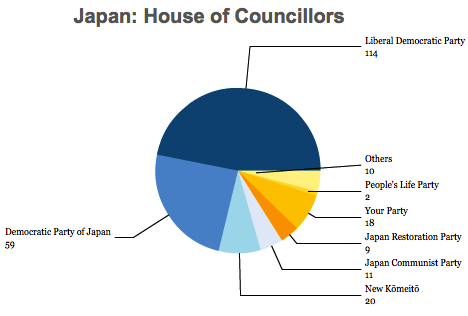More at the link: https://asia.nikkei.com/magazine/20170824/Tea-Leaves/Populism-fails-to-catch-fire-in-Japan
Japan lacks large numbers of recent immigrants to blame something on, and unemployment numbers have a 23-year low of 2.8% recently.
Those who struggle, blame themselves intensely. Also, society shames people on welfare.
Mainstream media ignores populist politics, worker's unions effectively useless at supporting worker's rights.
The one thing I don't like about Japan's Quality of Life is that it's almost too good.
British parliamentarian remarks, "My little recession can't be this cute."
Wait, I thought those struggling had nobody to blame but themselves?
Looks like shit will still hit the fan anyway.
Cheats & Tips if you want to be the next political leader of Japan.
Working in the Japanese media, it is hard to ignore the question on everyone's lips: "Why has anti-establishment populism spread around the world?" Equally puzzling for Western journalists, it seems, is the fact that Japan appears immune to this global trend.
Japan lacks large numbers of recent immigrants to blame something on, and unemployment numbers have a 23-year low of 2.8% recently.
Japan is unfavorable terrain for populists. For a start, it lacks one of the principal drivers of populism in Europe -- the presence of large numbers of recent immigrants. It is common these days to see people from other parts of Asia working in convenience stores saying, " Arigato gozaimashita" (Thank you very much), in accented Japanese. But there is little sense among Japan's aging population that immigrants are taking Japanese jobs; the unemployment rate hit a 23-year low of 2.8% in June. This contrasts sharply with many European countries, where globalization and mass immigration are seen as tearing the social fabric.
Those who struggle, blame themselves intensely. Also, society shames people on welfare.
For those struggling to get by, especially among the young for whom climbing the economic ladder seems like a pipe dream, the lack of an "other" to blame means they turn their frustrations inward, which partly explains Japan's high suicide rate. Low income is often attributed to a lack of personal effort, leading to criticism of people on welfare.
Mainstream media ignores populist politics, worker's unions effectively useless at supporting worker's rights.
Jeff Kingston, a professor at Temple University in Tokyo, also points to the "institutionalized interests in Japan that look suspiciously on populist politics." Kingston notes that mainstream media tend to ignore the stark realities facing millions of Japanese, while the Japanese Trade Union Confederation, or Rengo, has "become a tool of business rather than an effective voice for workers."
The one thing I don't like about Japan's Quality of Life is that it's almost too good.
/reference
British parliamentarian remarks, "My little recession can't be this cute."
/meme
Most importantly, Japan's failure to nurture a populist revolt reflects its quality of life, which is pretty decent for most people. Thanks to deflation, everyday goods are relatively cheap. The crime rate is low. Basic education is excellent. The streets are clean. The trains run on time. In a book on Japan, David Pilling, the Financial Times' former Tokyo bureau chief, quotes a visiting parliamentarian from northern England who looked at Tokyo's throbbing streets and said: "If this is a recession, I want one."
Wait, I thought those struggling had nobody to blame but themselves?
Younger people like me complain over drinks about the privileges that the older generation enjoyed -- a growing economy, lifetime employment, steady wage increases. In reality, though, such complaints are a conversation-starter that lacks substance. After a couple of glasses and a good night's sleep, it is back to work as usual the next day.
Looks like shit will still hit the fan anyway.
None of this means that Japan will stay quiet forever. Gross government debt is equivalent to a staggering 240% of gross domestic product. The country's potential economic growth rate is headed toward zero. And the Bank of Japan cannot buy stocks and government bonds to shore up the economy for eternity.
Cheats & Tips if you want to be the next political leader of Japan.
Even so, said Harukata Takenaka, a professor at Japan's National Graduate Institute for Policy Studies, voters are more likely to respond to a "coolheaded leader" than to a Trump-style insurgent. "Someone who will say: 'You all know that this country is in a precarious state. That's why you don't spend. That's why you worry about the future. Let's think about the solutions together.'"

